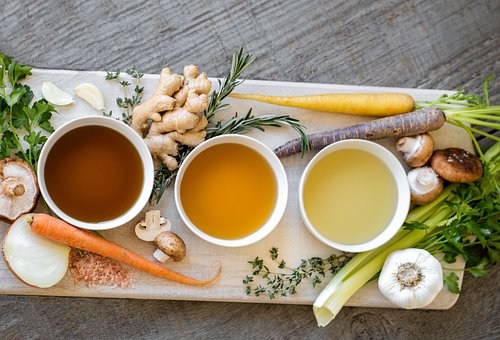Bone broth has become popular. Claims about bone broth say that it is a high-protein comfort food that is easy to take with you on the go. This substance is not only believed to be able to heal a damaged digestive system, but is also thought to improve conditions such as arthritis and a weak immune system.
Bone broth can be found everywhere even in restaurants.There’s a bone broth to-go chain in New York City and there’s even a line of bone broth made specifically for dogs and cats.
But what’s the truth about bone broth? Is it the magical elixir it’s claiming to be?
Bone Broth
Bone broth is created by boiling the bones and connective tissue of animals for an extended amount of time.
The broth is full of gelatin and minerals, including calcium and phosphorus, because it is cooked for a long time – from eight to over 24 hours.
An extractor of apple cider vinegar or red wine helps to pull out vitamins and minerals. A bone broth recipe will sometimes call for vegetables such as carrots, onions, and celery. After cooking, the liquid is strained and the solid parts are removed. The remaining broth is then seasoned.
Bone Broth Benefits for Health
Apparently, there are many potential benefits to consuming bone broth. But what does the science say? Does bone broth measure up to these claims?
1. It’s a Nutritional Goldmine
There is a lot of attention given to bone broth for its unique nutritional profile. Many people enjoy bone broth for its low calorie content and nutrient levels of calcium, iron and potassium.
One cup of beef bone broth contains:
- Calories: 31
- Protein: 5 grams
- Fat: 3 grams
- Carbohydrates: 1.7 grams
In 1937 a common way to nourish an infant was with bone and vegetable broths. A study done in 1937 looked at the nutritional value of bone broth compared to vegetable broth. The researchers found that while both options were not very good sources of nutrition, the broths that had more vegetables generally had higher mineral content.
A study in the journal Food and Nutrition Research from 2017 found that bone broth is not an especially good source of calcium or magnesium. It seems that the vegetables used in the cooking process, not the bones, may provide many of the helpful nutrients that marketers tout for bone broth.
An average cup of bone broth contains anywhere from zero to nineteen milligrams of calcium and six to nine grams of protein. But when you compare it to some other sources of these nutrients, the protein content isn’t terribly impressive:
- Collard greens: 1 cup = 150 mg calcium
- Navy beans (boiled): 1 cup = 126 mg calcium
- Baked beans: 1 cup = 14 grams protein
- Unsweetened soymilk 1 cup = 12 grams protein
- Peanut butter: 2 tablespoons = 7 grams protein
Although bone broth does provide some calcium and protein, it is not a significant enough amount to make it a worthwhile addition to your diet. A cup of cooked kale has a much higher calcium content than a cup of bone broth. Baked beans contain nearly twice as much protein as bone broth.
2. It Will Strengthen Bones, Relieve Achy Joints, and Keep Skin Youthful
Collagen is the main protein in your body. This protein plays an important role in keeping your body healthy and functioning properly. Plastic surgeons like it because it promotes skin elasticity.
As you age your body produces less collagen. Many marketing strategies claim that bone broth will help improve your health by increasing collagen levels.
Although there is no evidence that consuming collagen is beneficial to the body, some people continue to do so.
Collagen contains 19 amino acids. When proteins are digested or broken down, amino acids are left. The human body uses amino acids to make proteins to help the body: digest food, grow, repair tissue and be an energy source.
You’ve probably seen collagen supplements sold for skin health.
Some research suggests that collagen supplements may help to reduce visible signs of aging, such as wrinkles and cellulite. However, the collagen in supplements is hydrolyzed, or broken down to make it more usable for the body.
The collagen in bone broth is not able to be broken down and does not have the same positive effects in the body.
The best way to help your body build collagen is by eating a diet rich in leafy green vegetables. Plants offer rich sources of the phytonutrients your body needs to make collagen.
These phytonutrients in plants include:
- The vitamin C found in citrus fruits, dark leafy greens, bell peppers, kiwi, berries, and broccoli. Vitamin C is a powerful antioxidant that can help protect your skin, inside and out.
- The vitamin E is present in sunflower seeds, almonds, wheat germ, spinach, and broccoli. Vitamin E works with vitamin C to promote collagen synthesis.
- The vitamin A that’s found in carrots, sweet potatoes, winter squash, dark leafy greens, cantaloupe, and apricots.
- The amino acids glycine, proline, and lysine found in dark leafy green vegetables, soy, nuts, seeds, and legumes.
- The sulfur-containing foods, such as garlic, onion, and members of the cabbage family, may also promote collagen production.
Many vegetables and other plant foods can help keep skin young, bones strong, and joints healthy.
3. It Can Cure Your Cold
You’ve probably had chicken noodle soup while sick at some point in your life. It might have even helped you feel better.
Some research that is older looked at whether or not chicken stock could help with symptoms that are associated with the common cold. Many people believe that bone broth can have a similar effect.
There is no scientific evidence to support the claim that bone broth can help fight illness, although a few studies have looked at the effects of chicken soup.
A study published in 2000 in the journal Chest found that chicken soup can help prevent white blood cells from migrating, which can help prevent the worsening of upper respiratory infection symptoms.
This study found that not only chicken, but also the vegetables in soup offer inhibitory effects against infections. The researchers concluded that chicken soup was likely medicinal due to containing multiple substances.
Would vegetable soup have been just as effective? Or more effective? We don’t know. It is clear that the vegetables played an important part, at a minimum.
A 1978 study found that hot chicken soup was better than cold liquids at relieving symptoms of upper respiratory infections, such as loosening nasal mucus.
Although bone broth may make you feel warm and comfortable, there is no scientific evidence to support the claim that it can cure a cold. The possible immune-boosting effects of chicken soup could come from the vegetables used in its preparation.
READ MORE: Common Cold Fast Facts
4. It’s Good for Your Gut
Advocates say that bone broth aids digestion and is therapeutic for leaky gut syndrome, a condition in which substances can pass from your intestines into your bloodstream.
Gelatin is said to bind water in the digestive tract and protect the lining of the intestines.
A few studies have found potential health benefits in rats when consuming bone broth, however this does not mean that bone broth can have the same effect on humans. More research is necessary to determine if bone broth consumption can provide similar health benefits to humans as it does for rats. We have very different intestinal lining than do rats. It’s possible it could help. This is only a theory at this stage.
There is evidence that you can improve your gut health by eating fiber-rich plants foods, including fermented foods. Fermented foods help to maintain a healthy gut microbiome. If you are looking for ways to support your digestive health with food, see this article.
5. Immune Health
Other research has shown that proteoglycans can stimulate the production of different types of immune cells. Modern science is supporting what grandmothers have known for ages!
For centuries, people all over the world have used bone broth to treat the flu, colds, coughs, and sinus issues.
Chicken soup is often called “Jewish penicillin” because it is used in Jewish cuisine to treat and prevent illness. The secret ingredient that makes it so potent? Chicken feet that are rich in gelatin are a staple in Jewish chicken soup recipes!
We are only beginning to understand the relationship between the gut wall and the immune system.
About 70% of our immune system is located in our gut, and a weakened gut (known as “leaky gut”) can lead to more complex autoimmune problems.
The amino acids in collagen and gelatin are essential for a healthy gut lining and immunity.
6. Sleep And Mental Health
Minerals can have a soothing effect on the body. Magnesium helps to relax our muscles and may contribute to the calming effect of broth.
But the high glycine content in bone broth could also be the reason why it is so effective. Recent studies have found that glycine can help to lower core body temperature, which is associated with deep sleep.
Glycine is a calming neurotransmitter that helps to stabilize our moods. What if your doctor recommended bone broth instead of an antidepressant?
It’s worth trying bone broth before taking supplements for issues like magnesium deficiency or glycine deficiency.
7. Bone Health
It makes sense that bone broth would be a good source of minerals and therefore a good food for bone health. But research from the past and present suggests otherwise.
A study found that bone broths have low levels of calcium. Recent research has also found low mineral levels.
Although minerals are important for the integrity of bones, there is more to it than that. Bone is a living tissue. The inside of the body contains a complex system of tissues that are active and metabolically connected, such as cartilage, nerves, blood cells, marrow, and collagen. Yes, collagen.
Collagen is a protein that helps to keep bones strong and pliable, as well as other tissues in our body. Think of your bones as a structures made of bricks.
The minerals act as the bricks in the cartilage, with the collagen between the bricks acting as mortar to hold everything together.
Studies with collagen hydrolysate have demonstrated improvement for bone health in those who suffer from osteoporosis and osteoarthritis.
Post menopausal women who took 5 grams of collagen peptides per day for one year increased their bone mineral density and reduced the markers for bone degradation, according to a 2018 study.
The mineral content of bone broth has been studied, but only on bone broth alone, not in combination with other foods as it is usually consumed. Mineral-rich vegetables, meats, eggs, and even dairy can all be added to bone broth to boost its mineral content.
Conclusion
One problem with nutrition science is that it tries to study nutrients in isolation, while in reality nutrients never exist in isolation and always work together.
Most people who report bone broth benefits do so for two reasons. First, they’ve started consuming it regularly. Secondly, they decrease their intake of sugar, alcohol, and processed foods while increasing their consumption of healthy fats, fruits, and vegetables, these individuals are furthering their efforts to improve their overall health.
No one’s experience is more important than yours. If you have gut problems or any of the other listed issues, you could improve your condition by regularly drinking bone broth, as well as making other diet changes.









